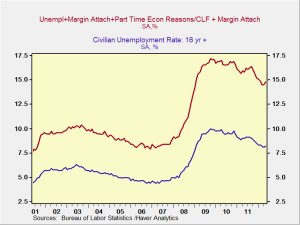Short term, overall market activity is largely random. Unless, that is, there is some overwhelming new information that can, in fact, change the aggregate valuation level. We thought that might happen this morning, with the Supreme Court preparing to rule on Obamacare. As it turns out, we’ll have to wait three more days, until June 28, to find out whether a proposed restructuring of about 18 percent of the U.S. economy is constitutional or not.
To quote our vice president, this is a big #*%!-ing deal. I don’t want to get into the details of the policy: first of all, I’m not qualified, and second of all, I try to stick to facts rather than opinions here. The factual takeaway, though, is that the federal government has asserted a right to restructure nearly a fifth of the economy. Literally everyone’s life will be affected in one way or another.





